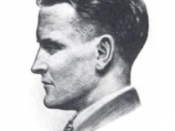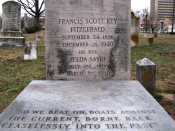A Sensible Man with Sensible Writing "The Sensible Thing," by F. Scott Fitzgerald shares numerous characteristics with his other writings. Like many writers, his work was heavily influenced by his life. Published criticisms note similarities between attitudes of the Roaring Twenties. In order to interpret "The Sensible Thing," it is necessary to examine F. Scott Fitzgerald's life and work.
The materialistic, free-thinking ideas characterizing greatly influenced the writings of F. Scott Fitzgerald. Furthermore, his relationship with Zelda Sayer, like a roller coaster, went through many ups and downs, and this continued throughout his life. After "a courtship of a year and a half," (Bloom 83) Fitzgerald finally thought he made "the fortune that would convince the girl" to marry him (84). Only upon the publication of his first novel did Zelda promise a wedding because she wanted financial stability. According to tradition, when a couple marry, they become one.
It is understandable that during Zelda's "gradual deterioration from schizophrenia and eventual breakdown," (Votteler 6:44) her spiral downward dragged Fitzgerald down as well (Bloom 85). Attempting to cope with her schizophrenia, Fitzgerald traveled frequently to be near his wife. Drawing from his experiences of traveling around the world, he created the settings for many stories (Troskey 4:143). Moreover, during this era, society's conception of good and bad mattered greatly. The Fitzgeralds were "eager to participate in the moneyed society around them," and they both believed "the purpose of money was to realize the promises of life" (Bloom 84). For many of that time, including the Fitzgeralds, money and popularity were priorities because these people were of shallow and vain character. Finally, the lifestyles of the Fitzgeralds, attending lavish parties and socializing with the wealthy appeared as common subject matter in his stories. Believing that Fitzgerald, participating in these social...


